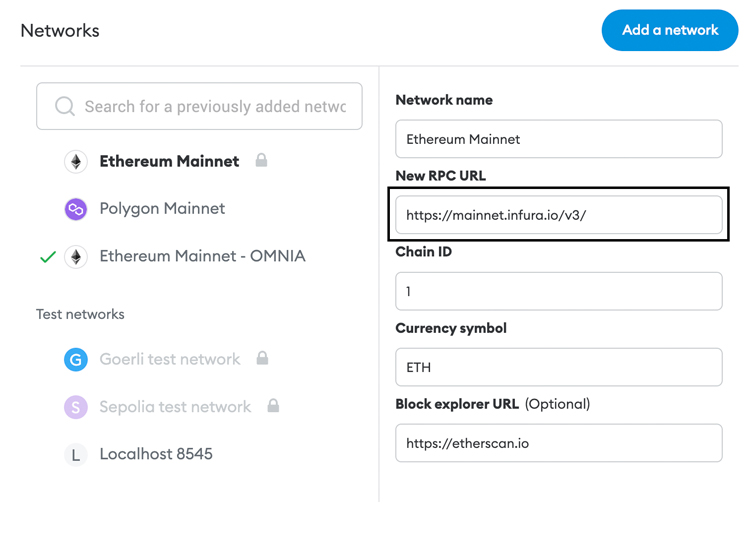Private and Secure Ethereum endpoints
What is an RPC?
Remote Procedure Call (RPC) is a protocol where one program can request a service from a program that resides on another computer. RPC uses a client-server model. It allows one machine to call a procedure from another.
What is an Ethereum JSON-RPC?
An Ethereum RPC is a way for developers and users to communicate with an Ethereum node and interact
with the Ethereum blockchain network.
Access to Fast and Secure Ethereum Endpoints
Paid plans include OMNIA’s expert support and assistance.
It allows them to perform various actions such as sending transactions, querying the state of the network, and interacting with smart contracts deployed on it. It acts as a bridge between the user’s application and the Ethereum node, allowing seamless communication between the two. The Ethereum RPC uses the JSON-RPC protocol, which is based on the JSON data format, making it easy to integrate with other systems.
Why are the OMNIA private endpoints needed for Ethereum?
OMNIA supports Multiple Ethereum Networks
Mainnet: Live
Ethereum network where transactions take place and Ether used for fees and rewards.
Goerli:
Public cross-client test network for testing upgrades and developments without spending real Ether.
Sepolia:
A private Ethereum network for enterprise use, offering more control and privacy over transactions.
Promote Decentralization
Infura is one of the largest centralized Ethereum node providers and handles billions of daily requests. Yet, the caveat remains that Infura is operated by a single, centralized provider and relies on centralized cloud servers – thus increasing the risk of systematic vulnerabilities due to the single point of failure. To combat this, Omnia leverages a combination of decentralized node infrastructure with high availability mechanisms to reduce the impact of single points of failure and mitigate corresponding risk factors.
Prevent Frontrunning and Enhance User Privacy
Within the Ethereum blockchain, frontrunning remains a rampant multi-billion dollar issue. This is where DeFi projects are exploited for the purpose of raking in excess of funds with an ulterior motive rooted in greed. Unsurprisingly, this is illegal within traditional financial markets.
What is Frontrunning? It is when someone is privy to pricing information of a trade and uses this knowledge to profit.
Untraceable Blockchain Nodes Infrastructure
• The most reliable RPC provider
• Secure access to Ethereum RPC
Get your Ethereum RPC Endpoint
In Ethereum, adversaries exploit the slippage parameter of DeFi transactions with frontrunning attacks. The attacks happen during the waiting time, when transactions are pending in the mempool before they are validated and accepted in the blockchain – the attacker uses this information to prepare additional transactions that go before and after the victim’s transaction.
How To Add And Secure A Custom Ethereum RPC Endpoint
Video: How to add a secure Ethereum RPC endpoint to MetaMask Wallet
1. Go to the OMNIA dashboard, install MetaMask and ‘Generate Endpoint’.
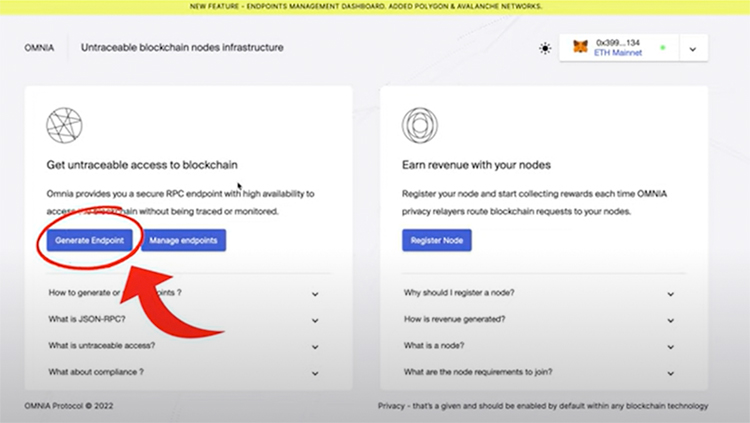
2. Next, select the Ethereum blockchain and network.
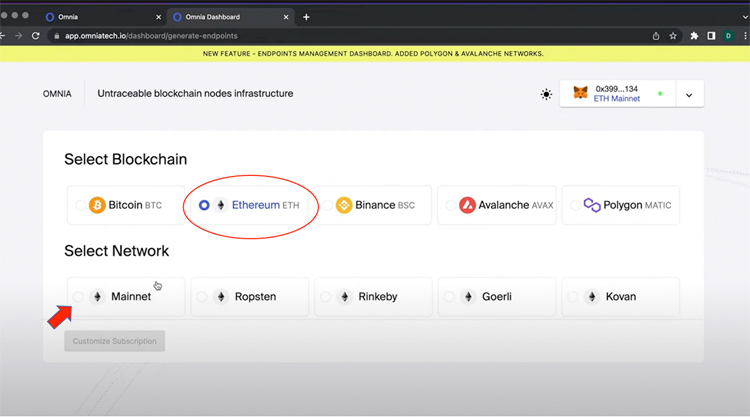
3. Create your customizable subscription to access Ethereum RPCs, agree to terms and sign message request.
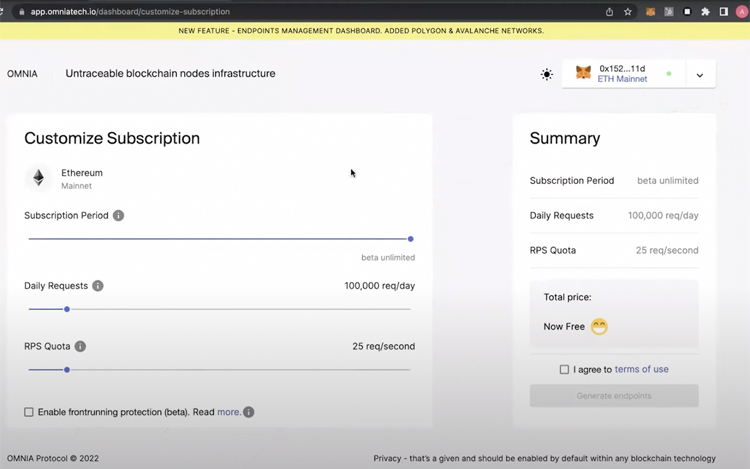
4. Next, copy the address displayed to customize your wallet’s RPC connection.
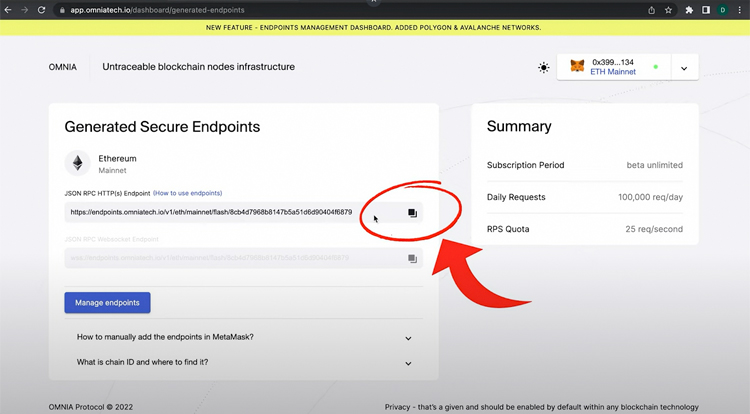
5. Go to MetaMask, locate the drop-down menu and ‘Add Network’. Click on Ethereum Mainnet and “Add a Network Manually”. Paste newly created JSON RPC HTTP Endpoint in the field ‘New RPC URL’.
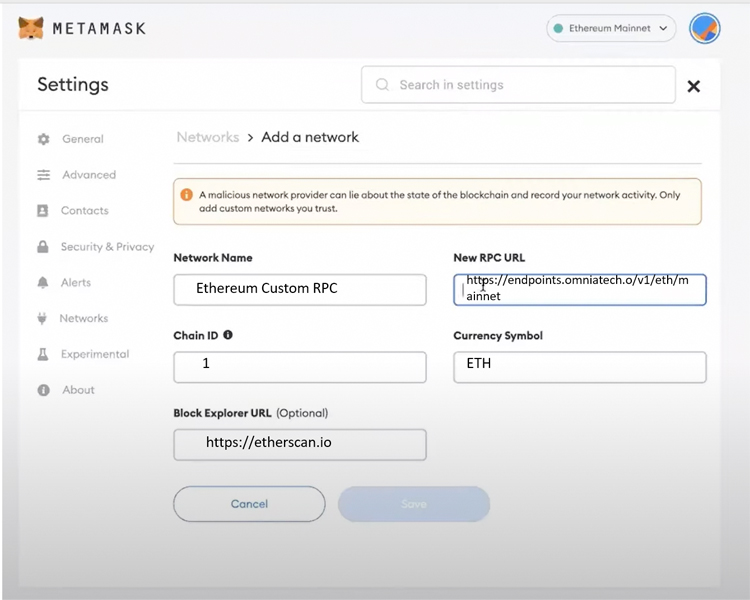
Congratulations, Ethereum Custom OMNIA RPC” was successfully added!
How To Find My Current Ethereum RPC URL in Metamask
Go to your MetaMask wallet and go to “Settings”, then “Networks”. Click on the “Ethereum Mainnet”.
